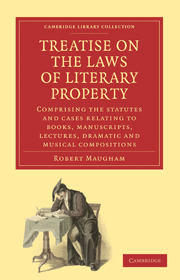 Treatise on the Laws of Literary Property
Treatise on the Laws of Literary Property Book contents
- Frontmatter
- LAWS OF LITERARY PROPERTY
- ANALYTICAL TABLE OF CONTENTS
- BOOK I HISTORICAL VIEW OF THE LAW
- BOOK II THE PRESENT STATE OF THE LAW
- FIRST PART. OF THE DURATION AND EXTENT OF COPYRIGHT
- SECOND PART. OF THE LIBRARY TAX, AND REGISTRY AT STATIONERS& HALL
- THIRD PART. OF PIRATING COPYRIGHT
- BOOK III DISQUISITIONS ON THE PRINCIPLES OF THE LAWS AND THEIR EFFECT ON LITERATURE
- NOTES, COMPRISING AUTHORITIES REGARDING THE LIMITATION OF COPYRIGHT, AND THE LIBRARY TAX
- TABLE OF CASES CITED OR REFERRED TO, AND WORKS OR SUBJECTS LITIGATED
- INDEX
- ERRATA
THIRD PART. OF PIRATING COPYRIGHT
Published online by Cambridge University Press: 05 August 2011
- Frontmatter
- LAWS OF LITERARY PROPERTY
- ANALYTICAL TABLE OF CONTENTS
- BOOK I HISTORICAL VIEW OF THE LAW
- BOOK II THE PRESENT STATE OF THE LAW
- FIRST PART. OF THE DURATION AND EXTENT OF COPYRIGHT
- SECOND PART. OF THE LIBRARY TAX, AND REGISTRY AT STATIONERS& HALL
- THIRD PART. OF PIRATING COPYRIGHT
- BOOK III DISQUISITIONS ON THE PRINCIPLES OF THE LAWS AND THEIR EFFECT ON LITERATURE
- NOTES, COMPRISING AUTHORITIES REGARDING THE LIMITATION OF COPYRIGHT, AND THE LIBRARY TAX
- TABLE OF CASES CITED OR REFERRED TO, AND WORKS OR SUBJECTS LITIGATED
- INDEX
- ERRATA
Summary
CHAP. I.—OF PIRATING THE COPYRIGHT IN PRINTED BOOKS
SECT. I.—Of Original Works
It would, perhaps, be unreasonable to expect, that any full and precise definition should have been made of the extent to which a writer may lawfully quote or extract from the works of his predecessors. The courts have generally confined themselves to the decision of the mere point in litigation. The general principle, however, may be collected to be, that extracts made in a bona fide manner, are justifiable. According to some authorities, however, they must not be so extensive as to injure the sale of the original work, even though made with no intention to invade the previous author; nor must they be speciously or colorably adapted from the original into a form differing only in appearance and manner of composition.
The identity of a literary composition, says Blackstone, consists entirely in the sentiment and the language. The same conceptions, clothed in the same words, must necessarily be the same composition : and whatever method be taken of exhibiting that composition to the ear or the eye of another, by recital, by writing, or by printing, in any number of copies or at any period of time, it is always the identical work of the author which is so exhibited.
- Type
- Chapter
- Information
- Treatise on the Laws of Literary PropertyComprising the Statutes and Cases Relating to Books, Manuscripts, Lectures, Dramatic and Musical Compositions, pp. 126 - 178Publisher: Cambridge University PressPrint publication year: 2010First published in: 1828
